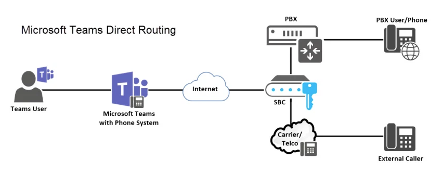UNICC supports clients with state-of-the-art voice solutions
Many United Nations Agencies are transitioning from conventional enterprise telephony systems to cloud-based solutions that allow users to make mobile, landline and international phone calls through Voice over Internet Protocol (VoIP) connections, with options for modern desk phones and computer ‘soft’ phones, unifying a whole set of communications collaboration tools across the enterprise.
UNICC has been acting as a key enabler for many Partner Organizations who wanted to adopt and modernize their enterprise voice solutions during the challenging times brought by the COVID-19 pandemic.
Gabriel Galati, Head, Digital Workplace Services Unit, UNICC
UNICC has been involved in multiple migrations, implementing customized cloud-based solutions that take into account each organization’s legacy telephony equipment and infrastructure, current phone carrier, location and local calling plans, organizational cloud strategy, functionality and interoperability requirements as well as current and evolving business needs.
UNICC is currently supporting up to ten UN entities and related organizations in their transitions to cloud telephony, including ADB, ICJ, IFAD, ITC, ITU, OPCW, UN Women, WTO and WFP HQ, with other UNICC Clients in the pipeline.
Our mission is to provide our Clients with the unique experience of making professional phone calls from anywhere at any time. And to do it in a “UN style,” achieving more with less.
Ricardo Pardal, Project Lead, Unified Communications, UNICC

Microsoft voice system common option for the UN. Credit: Microsoft
The most common options (which can be mixed and matched) include an all-in-the-cloud solution, bringing the organizational phone carrier to the M365 phone system in the cloud or on premises) with different Session Border Controller options to connect to the Public Switched Telephone Network (PSTN Carrier/Telco):
- Phone system with Calling Plan (all-in-the-cloud solution)
- Phone system with organizational phone carrier with Direct Routing
- Phone system with organizational phone carrier via Skype for Business (/Teams) server
- Enterprise Voice in Skype for Business (/Teams) server with own carrier.
Most UN Agencies chose the Microsoft Teams Direct Routing option through which they follow a gradual transition, integrating first the organization’s telephony equipment and/or third-party provider to the Microsoft Teams telephony solution in the cloud, moving through different stages of coexistence before eventually disposing the old system and embracing a comprehensive, cloud-based telephony implementation.
One of the key benefits of cloud telephony is that it allows to establish the least-cost route on calls. With voice gateways anywhere in the world, Clients can pay local instead of international fares while calling anywhere, anytime. UNICC has gateways in Italy, Spain, Switzerland and the US, but if the Client requires a new gateway, it can be established in the Microsoft Azure Cloud in just two days.
Moreover, with cloud telephony an organization can unify all its communications and collaboration tools, minimizing the number of applications their users need for calling, video meetings, instant messaging, Business Relationship Management and business processes.
Microsoft Teams is a solid solution, with an engine that has been developed and continually improved for over a decade and a modern front-end. But the UNICC Unified Communications team is also equipped to serve Clients who are interested in alternative solutions, for example Clients who prefer or require retain the functionality provided by on premise systems and a blend of traditional (landline) PSTN and VoIP (voice over IP) telephony options.
For instance, UNICC manages legacy Skype for Business and Cisco telephony systems, both on premise and in the cloud, for several Clients. Additionally, the team has in-house experts on Zoom, Polycom and more telephony and voice vendors, to fulfill each organizations’ business requirements, with interoperability between systems always available.
Microsoft Teams, with its voice solutions and other integrative apps is a versatile and powerful platform that can boost productivity and collaboration as no other application before it.
Mihai Petrescu, Operations Lead, Unified Communications, UNICC
UNICC also offers Calling Plan options with no legacy hardware nor provider. Through Microsoft Teams, the Client can call to phone numbers around the world without requiring any deployment or maintenance of on premise equipment. This is a streamlined and cost-efficient solution for Clients that want to skip the coexistence phase and move directly to fully cloud-based telephony. Cloud-based Calling Plans, however, are not available in all countries, making this a challenge for most UN Agencies.
The continuous commitment of the UNICC Unified Communications group, their technical expertise and their Client intimacy has allowed smooth enterprise voice integrations overcoming many challenges brought by the diversity and legacy of Client’s Unified Communications systems.
Gabriel Galati, Head, Digital Workplace Services Unit, UNICC
UNICC’s knowledge of the United Nations ecosystem means that its Unified Communications team can help each organization to obtain the option with best return on investment, whether that means reusing older networks and infrastructure, leveraging Skype for Business or Microsoft Teams licenses already purchased or adopting a brand new Calling Plan scenario.

